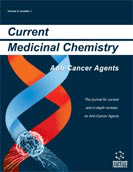Abstract
Gastrointestinal cancers are among the most common causes of cancerrelated death in the world. Alone the subgroup of colorectal cancer is the third most common cancer in men (746,000 new diagnosed cases in 2012, 10.0% of all cancer cases) and the second in women (614,000 new diagnosed cases in 2012, 9.2% of all cancer cases) worldwide. Beside different treatment strategies including surgery, radiotherapy and/or chemotherapy have improved the survival of patients in the last years, there is still an urgent need to improve prognosis in advanced disease by means of targeted therapies as well as an early detection of development of acquired resistance. For this purpose, molecular biomarkers are a promising option especially in the light of increasing amount of personalized medicine. In this chapter, we will review classic biomarkers for prognosis already in clinical use (e.g. carcinoembriogenic antigen, cancer antigen 19-9, serum pepsinogen I, α- fetoprotein, CD117) and new ones with their usefulness following combined therapeutic regimens. Some new technologies like the very sensitive digital-drople- -PCR, next-generation sequencing and high-throughput screening methods for RNA expression patterns will be discussed shortly regarding their application for detecting and discovering potential new biomarkers. Finally, possible new potential mechanisms of resistance related to targeted pathways will be discussed as genetic and epigenetic alterations (hypermethylation of CpG-islands, copy-number variation, lncRNAs and single nucleotide polymorphisms). Furthermore, the potential of circulating tumour DNA and non-coding RNAs, with a special focus on microRNAs as new biomarkers will be addressed.
Keywords: α-fetoprotein, Anal cancer, Billary tract cancer, Biomarker, CA19-9, CD117, CEA, Cft-DNA, Cholangiocarcinoma, Colorectal cancer, Digital-droplet PCR, Gallbladder cancer, Gastric cancer, Gastrointestinal cancer, Liver cancer, Liquid biopsy, lncRNA, Microarrays, MicroRNA, Microsatellite instability, NanoString, Next-generation sequencing, Oesophagus cancer, Pancreatic cancer, SEPT9, Serum pepsinogen I, Small intestine cancer, TAG72, TPS.






















